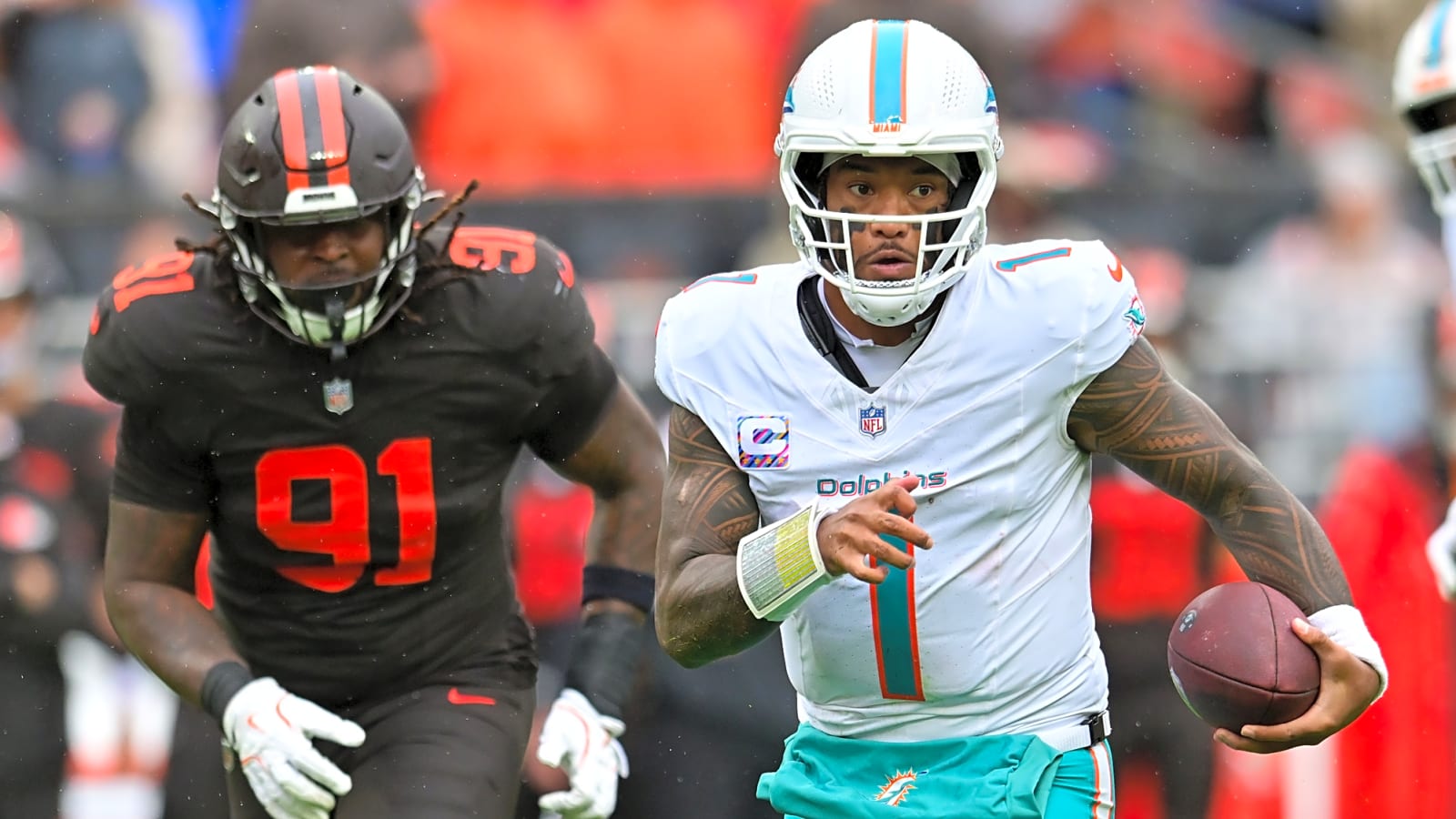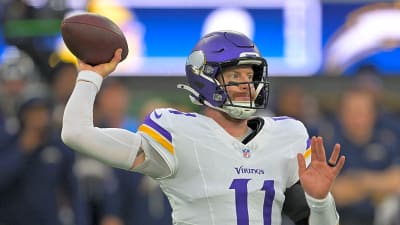
In the aftermath of a deeply disappointing 31-6 loss to the Cleveland Browns, the Miami Dolphins found themselves at a crossroads. The offense, once a high-flying spectacle, was grounded, and quarterback Tua Tagovailoa delivered one of the worst performances of his career. The frustration among the fanbase was palpable. But amid the gloom, something significant happened in the post-game press conference. Tagovailoa, often criticized for deflecting blame, stood at the podium and took ownership of his struggles. It was a moment of accountability that could signal a crucial turning point for both the quarterback and the franchise.
Miami Dolphins QB Tua Tagovailoa Owns Up To Poor Play
The Dolphins entered their game against the Browns expecting to get back on track. Instead, they delivered a performance that head coach Mike McDaniel later admitted was humbling. The offense was stagnant, and Tagovailoa looked completely out of sorts. He finished the game with just 100 passing yards on 23 attempts and threw three costly interceptions before being benched in the fourth quarter. It was a statistical disaster that symbolized the team’s broader struggles.
In past moments of adversity, Tagovailoa’s public comments have sometimes been interpreted as placing blame on external factors—miscommunication with receivers, protection breakdowns, or play-calling. This time, however, the tone was starkly different. He looked inward, offering a raw and honest assessment of his own play.
“Definitely not happy, not proud of where I’m at with my play, with how I’ve gone about things this year,” Tagovailoa admitted. “I know I got to be a lot better, and I’ve been better for the Miami Dolphins years past. But this isn’t years past. This is this year.”
This statement was a departure from the norm. By explicitly stating he was “not proud” and acknowledging that past success is irrelevant to current struggles, Tagovailoa demonstrated a level of self-awareness and accountability that had been missing. He took it a step further, touching on the burdens of leadership and the challenge of elevating the players around him while trying to rediscover his own rhythm.
“Just trying to maneuver everything and trying to build a collection of guys to kind of bring along with me, and I got to kind of be able to multitask… to get the whatever it was last year and the years prior for myself to get going again and get in that flow,” he said.
The Significance of Taking Ownership
For a franchise quarterback, on-field performance is only part of the job. Leadership, especially in the face of adversity, is paramount. Tagovailoa’s willingness to publicly shoulder the blame is significant for several reasons.
1. It Validates the Frustration
Fans and analysts could clearly see that the quarterback play was not up to par. By admitting it himself, Tagovailoa validates those observations and shows he is not living in a bubble of denial. This builds credibility and shows respect for the game and for those who follow it.
2. It Sets a Standard for the Locker Room
When the leader of the team takes responsibility for his shortcomings, it eliminates the possibility of finger-pointing within the locker room. It sends a powerful message: if the quarterback can own his mistakes, everyone can. As Head Coach Mike McDaniel put it, “Every person on our team, if you’re saying ‘It’s not me,’ it’s you.” Tagovailoa’s comments were the living embodiment of that philosophy.
3. It’s the First Step Toward a Solution
A problem cannot be fixed until it is acknowledged. For weeks, the Dolphins’ offense has sputtered, looking like a shadow of the explosive unit that took the league by storm in previous seasons. Tagovailoa’s open admission that his play has not been good enough is the necessary first step toward diagnosing the root causes and working to correct them. It signals a commitment to getting back to the fundamentals and rediscovering the form that made him a Pro Bowl quarterback.
Can Tua Recapture His Past Form?
Tagovailoa’s comments rightly point out that “this isn’t years past.” The quarterback who led the NFL in passer rating in 2022 and threw for over 4,600 yards in 2023 seems to have vanished. The precision, timing, and anticipatory throws that defined his best moments have been replaced by hesitation and costly turnovers.
The central question now facing the Miami Dolphins is whether this is a temporary slump or a sign of a larger regression. Several factors could be contributing to his struggles:
- Defensive Adjustments: The league has had years to study Mike McDaniel’s offense. Defenses are increasingly employing schemes designed to take away the middle of the field and disrupt the timing of Miami’s routes.
- Offensive Line Issues: Injuries and inconsistent play along the offensive line have led to more pressure on Tagovailoa, perhaps affecting his confidence in the pocket.
- Mental Hurdles: The weight of a massive contract extension and the pressure to lead the team on a deep playoff run could be taking a mental toll.
Despite these challenges, there is reason for optimism. Tagovailoa has proven he has the talent to play at an elite level. His accuracy and quick release are natural gifts that don’t simply disappear. His recent comments suggest he now has the mindset required to fight his way out of this slump. The comments are a sign that he is ready to put in the work needed to reclaim his status as a top-tier quarterback.
The Path Forward: Accountability in Action
While Tagovailoa’s words were a positive step, actions will ultimately speak louder. Despite the calls from some fans to bench him long-term, Coach McDaniel has already confirmed that Tagovailoa will be the starter for their next game. This vote of confidence puts the ball squarely in the quarterback’s court.
“My expectation is that we don’t throw 10 picks,” McDaniel said, blending support with a clear challenge.
For Tua, the path forward is clear. He must translate his newfound accountability into tangible results on the field. This means better decision-making, improved accuracy, and, most importantly, protecting the football. The Dolphins’ season hangs in the balance, and their hopes of becoming a true Super Bowl contender rest on the shoulders of their franchise quarterback.
The loss to the Browns was a low point, but it may have been a necessary one. It forced a moment of introspection from the team’s most important player. By taking ownership of his struggles, Tua Tagovailoa has laid the foundation for a potential comeback. Now, he must build on it.
More must-reads:
- Vikings' quarterback gamble is looking like a major flop
- Eagles suddenly have new concern with A.J. Brown ahead of Giants matchup
- The 'Active 3-passing-TD game leaders' quiz
Breaking News
Trending News
Customize Your Newsletter
 +
+
Get the latest news and rumors, customized to your favorite sports and teams. Emailed daily. Always free!








